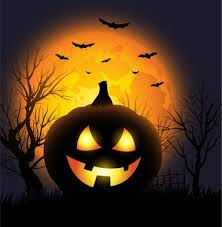I have vivid childhood memories of dressing up on Halloween night, racing through dinner and roaming my dark neighborhood on a quest for as much candy as my pillowcase and I could carry. Later at home, my sisters and I spent hours at our beloved ritual of sorting and trading; it was all so magical! We could become anything we chose for a night, roam at will in the dark, and consume mass quantities of candy before our mom confiscated our take for the night. Halloween was heaven on earth to us. 
Even as adults, many of us still love to decorate and dress up for Halloween. I’m probably not the only parent who reluctantly stayed behind when my middle-school aged children finally insisted that they wanted to trick or treat with their friends – alone! Americans love Halloween. In fact, we spent 8.4 billion dollars on Halloween in 2016. It’s our third largest party season, after Christmas and New Year’s and it’s the number one season for the purchase of humorous greeting cards! Yes, we’re tickled by Halloween, but many of us have no idea where it came from. As with most of our celebrations and rituals, Halloween is an amalgam of traditions passed along through time as people moved about the earth, exploring, conquering, finding freedom and seeking opportunity.
Many agree that our Halloween closely resembles early Celtic traditions from the area that became Ireland, the United Kingdom and Northern France. The Celts worshiped a sun god during the six-month growing season and believed that the lord of cold and darkness (i.e. winter) ruled from November to April. They believed that on October 31st (the night of transition between two gods), the boundaries between their worlds became permeable enabling spirits to roam the earth for a night. The Celts extinguished their hearth fires to make their homes cold and inhospitable. They dressed in spooky clothes and made noise to keep the spirits at bay; and they built huge hilltop bonfires to seek protection and offer strength to the sun god. The Druid priests would try to divine what lay ahead for the coming winter. Finally, each household would take home an ember from the sacred fire that would rekindle their hearth fire and protect them during the dark months ahead.
The Vigil of Samhain was essentially a way for the Celts to explain why the warmth of their beloved summer sun waned and to find comfort and fortification as they faced the hardship of the dark winter months. Many hundreds of years later, after conquering most of the Celtic lands, the Romans sought to superimpose their own traditions upon those of the conquered Celts. They incorporated Roman festivals with the Celtic celebration of Samhain. Feralia, also observed in late October, was the Romans’ time to commemorate the dead. A second festival honored Pomona, the Roman goddess of fruit and trees, whose symbol was the apple. Some identify this as the root of apple traditions (bobbing for apples, candy and caramel apples) that we still enjoy today.
In 731 A.D., Pope Boniface IV decided to designate November 1st as All Saint’s Day to honor saints and martyrs. Many believe that he hoped to replace the Celtic Samhain festival with this church approved holiday. Not surprisingly, the pagans were reluctant to relinquish their traditions. Hoping to vanquish heretical pagan behavior, the church began to discredit “unrepentant nonbelievers” as witches and renamed Samhain as The Night of the Witch. This was when a basically agrarian festival began to be connected with the devil and his followers who supposedly came out that night to make a mockery of the All Saints’ (a.k.a. All Hallows) Day celebration. Samhain began to be called All Hallows’ Even, then Hallowe’en and finally, Halloween. Several hundred years later, the church named November 2nd All Souls’ Day, a day upon which to honor the souls of those who have died.
No matter what we call it, Samhain, The Night of the Witch or Halloween, Americans still love to dress up as someone else for a night, visit with their neighbors, pull pranks and eat all of the goodies that we usually deny ourselves. Sounds like a wickedly good holiday made in heaven to me!